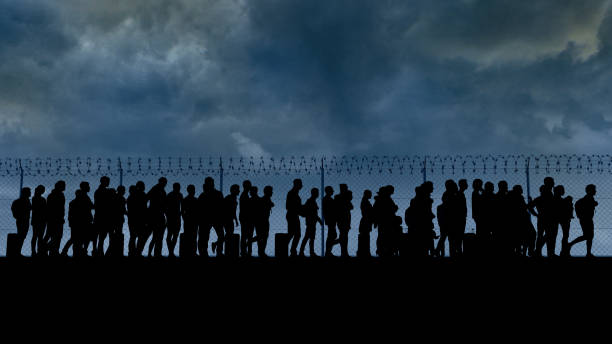
By Yazan Hamid / GICJ
The global crisis of displacement has reached unprecedented levels, with the United Nations High Commissioner for Refugees (UNHCR) reporting 120 million displaced individuals worldwide, more than any other time since WWII (2024 flagship Global Trends Report, UNHCR). Refugees, migrants, stateless persons, most of whom, women and children face imminent vulnerability to human trafficking in irregular migration. Although statistics surrounding human trafficking lack consistent granularity due to the complex circumstances of those involved as well as the correlated crisis of enforced disappearances, the International Labour Organisation (ILO) estimates 28 million victims of human trafficking annually (2022 Global Estimates, ILO), contributing to a $236 billion industry fueled by sexual exploitation, forced labour and forced marriage.
The United Nations Protocol to Prevent, Suppress, and Punish Trafficking in Persons, Especially Women and Children - a supplement to the United Nations Convention against Transnational Organised Crime - was adopted and opened for signature, accession and ratification by General Assembly resolution 55/12 in November of the year 2000; To be ratified in the year 2003. Since then, there has been continuous and concerning negligence regarding the implementation of effective mechanisms to combat the various facets of human trafficking. There remains a significant gap in effective mechanisms to address the intertwined issues of irregular migration and human trafficking.
Illegal and irregular migration pathways often expose those involved to severe risks, including exploitation and trafficking. Migrants lacking legal status or proper documentation are particularly vulnerable to traffickers who exploit their precarious situations. Women and children are disproportionately affected, often subjected to sexual exploitation, forced labour, and other forms of abuse. The punitive approaches to irregular migration adopted by many countries exacerbate these vulnerabilities. Migrants, refugees, and stateless persons, who can be subject to harsh penalties, detention and deportation, are more likely to rely on smugglers and traffickers to evade authorities. This dynamic creates a cycle of exploitation, as migrants are forced into debt bondage or other forms of coercion to pay for their passage.
The implementation efforts of the United Nations Protocol to Prevent, Suppress, and Punish Trafficking in Persons, Especially Women and Children, have faced multi-dimensional challenges. Many Member States have been criticised for their inadequate enforcement of anti-trafficking laws and lack of support services for victims. The Special Rapporteur on Human Trafficking, Ms Siobhan Mullaly, in her latest report to the United Nations Human Rights Council (UNHRC), highlighted significant shortcomings by Member States in implementing mechanisms to provide safe and regular migration pathways (27 June, 2024). These failures have perpetuated the risks associated with irregular migration and human trafficking.
One of the primary obstacles in addressing the intertwined crises of irregular migration is the lack of coordinated efforts by the international community. While various international agreements and protocols exist, their implementation is often fragmented and inconsistent. This lack of coordination hinders the development of a unified and effective response to human trafficking and irregular migration. Among those obstacles is the lack of necessary resources and infrastructure to effectively combat human trafficking and support victims. This includes insufficient funding for law enforcement, victim services, and prevention programs. Moreover, the stigmatisation of trafficking victims and irregular migrants prevents them from seeking help, further exacerbating their vulnerabilities. These victims can often be subject to criminalisation, contrary to the Non-Punishment Principles.
Various regional and national initiatives have been undertaken to address these crises, including the European Union's Strategy on Combating Trafficking on Human Beings, which focuses on prevention, protection of victims, prosecution of traffickers and partnership with non-EU countries. Despite these efforts, inconsistencies in national policies and enforcement mechanisms continue to undermine the strategy’s overall effectiveness. Here, we can analyse the importance of civil societies' involvement. Powerful corporations firmly grounded in large industries that are often involved are still able to manage without proper prosecution. The stigmatisation of trafficking victims and irregular migrants augment their challenges, while civil societies remain complicit due to widespread xenophobia and the normalisation of hostility.
The intertwined crises of human trafficking pose significant challenges to the international community. Despite various international protocols and national initiatives, there remain critical gaps in the implementation of effective mechanisms to protect vulnerable populations and combat trafficking networks. Addressing these crises requires a coordinated and comprehensive approach that includes, expanding safe migration pathways, the protection of human rights defenders involved in search and rescue operations, enhancing international cooperation, and providing adequate resources and support services for victims.
Geneva International Centre for Justice (GICJ), acknowledges the great strides undertaken by the international community to combat these crises. We call upon The United Nations Human Rights Council, United Nations High Commissioner for Refugees, as well as civil society organisations, to remain steadfast in their commitment to dismantling these industries. Additionally, we commend the work of The Special Rapporteur on Human Trafficking, Ms Siobhan Mullaly, in her diligent efforts to perpetuate the international community's crucial involvement and unparalleled advocacy for those involved. However, we recognise the significant shortcomings involved in combating these crises and urge the international community to collectively address the unfortunate reality of the current state of human trafficking and irregular migration. Only through such efforts can the international community hope to mitigate the risks associated with irregular migration and human trafficking and provide meaningful protection to those in need.
#GlobalCrisis #HumanitarianAid #InternationalCommunity #HumanTrafficking #HumanRights #IrregularMigration #Refugees #DisplacementCrisis #UnitedNations #CrisisResponse #GlobalSolidarity #GICJ #Geneva4Justice #GenevaInternationalCentreforJustice







